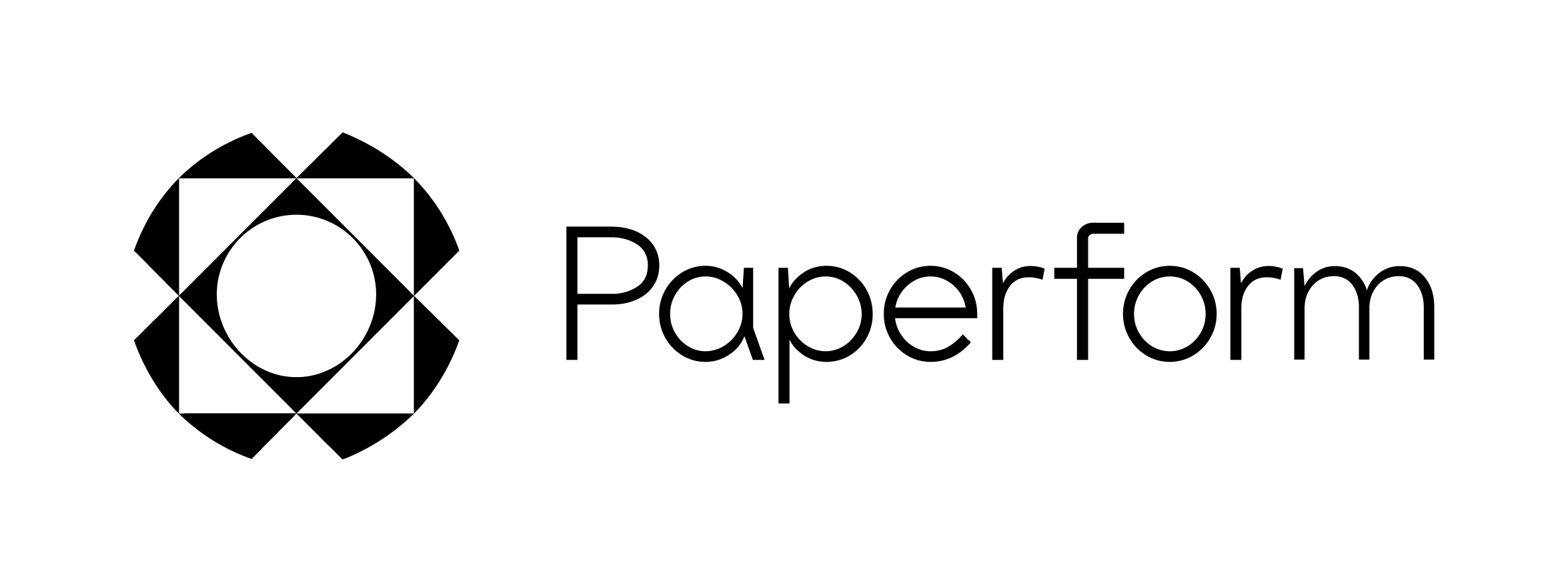
All Solutions

Explore all the solutions you can create with Paperform: surveys, quizzes, tests, payment forms, scheduling forms, and a whole lot more.
See all solutions










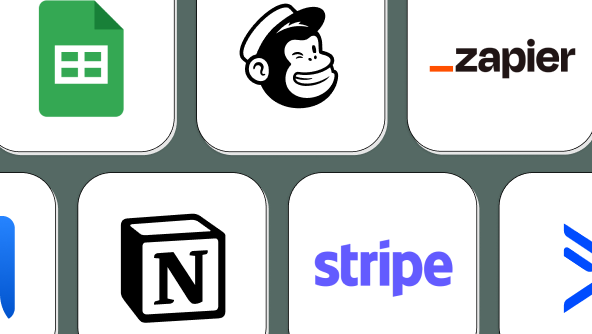
Connect with over 2,000 popular apps and software to improve productivity and automate workflows
See all integrationsProducts
Solutions
All Solutions

Explore all the solutions you can create with Paperform: surveys, quizzes, tests, payment forms, scheduling forms, and a whole lot more.
See all solutionsIntegrations

Connect with over 2,000 popular apps and software to improve productivity and automate workflows
See all integrationsResources
The 10 best Gumroad alternatives in 2026

Gumroad has been a popular solution for selling digital products for over ten years. But on December 17, 2022, during a public board meeting, it introduced a new pricing structure that effectively increased fees on the platform by 300% overnight.
oh well, suddenly Gumrad become the most expensive payment platform I know of 😅
— Tony Dinh 🎯 (@tdinh_me) December 18, 2022
- Stripe: ~3%
- Lemon squeezy: ~5%
- Paddle: ~5%
- Gumroad: 10% 😳 pic.twitter.com/4WPQifgNaj
Turns out that's... not a great strategy. The move has burned years of goodwill. Creators are leaving in droves (if you're reading this post, you're probably one of them).
To help all you Gumroad refugees, we've updated out list of Gumroad alternatives, so you can quickly find a solution, and get up and running ASAP.
What is Gumroad?
Gumroad is a platform that allows creators to sell products directly to consumers. It is primarily used by artists, writers, musicians, and other creative professionals to sell digital products like books, music, and art prints.
It's main selling point is that it offers a simple way for creators to set up an online store and start selling products. It's designed to be user-friendly, and require next to no technical knowledge to set up and manage.
Why look for a Gumroad alternative?
As we covered right off the top, the main reason people are leaving Gumroad is the fee changes. We'll get into that, alongside several other drawbacks that might make the move even easier to make.
1. Insane(!) transaction fees
Historically, Gumroad took a transaction fee based on the lifetime earnings of the individual creator. Unlike most similar models, the payout fee actually dropped as you earned more, making it more cost-effective the more you sold.
Not anymore. Starting from January 31, 2026, Gumroad will charge a flat 10% fee on all transactions. The announcement page says this is because they "want you to live a better life", which is perhaps some of the strangest messaging of all time.
 Image via Gumroad
Image via GumroadNotion consultant, Thomas Frank, pointed out that the 10% flat fee no longer includes credit card processing fees either, meaning it's "more like a 12.9% fee to sell on the platform."
Frank says the pricing change will make the fees on the $100k/month in sales he makes on the platform "go up to roughly $13,000"—"the rough cost of hiring at least one new full-time employee".
This fee structure makes Gumroad one of the most expensive options for selling digital products and memberships online. So yeah, it is a good time to make the switch.
2. A lack of personalisation options
Gumroad's 'creator profile' storefront is a strict template. You can add a profile picture, and insert a custom banner image, but that's about as far as it goes.
(You used to be able to use custom CSS to personalise the page a bit more, but they removed this feature in December, 2021). Now it gives you about as many customisation options as a Twitter or Instagram profile.
That's not to say there's anything wrong with the pages. They look professional, and the layout is clear. But if you want something that feels unique to you, then a Gumroad storefront isn't the answer.
3. Sales limitations
While you can sell a lot on Gumroad, there are some things that aren’t allowed. Some of these are industry standard—like illegal products—but others are a bit disappointing.
The most notable omissions are on services, event tickets, jewellery, food, and anything you didn’t create personally. Most other ecommerce platforms don't suffer these kind of restrictions.
The 10 best Gumroad alternatives for 2026
Alright, so we've covered some of the reasons you might be abandoning the Gumroad ship. But re there any other viable Gumroad alternatives? Of course there are!
1. Paperform
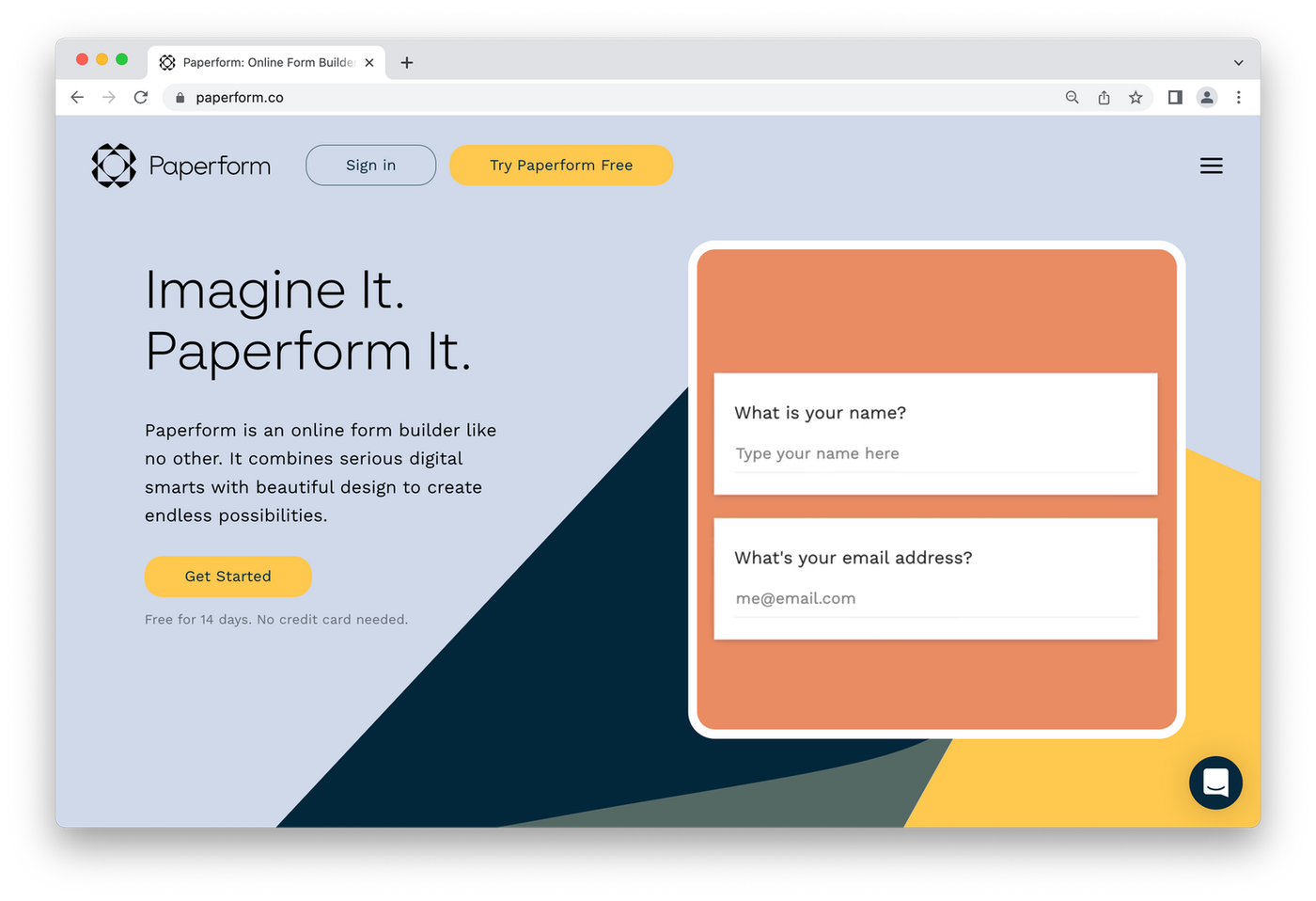 (Image Source: Paperform)
(Image Source: Paperform)Pricing:
- Essentials: $24/month
- Pro: $49/month
- Agency: $159/month
Paperform wasn't built as an alternative to Gumroad. It started out as a flexible online form builder, but over time it's grown into a digital Swiss Army knife that can do everything from build forms to sell products and manage bookings.
So why not use it to host your online store?
It's built from the ground-up to be easy for anyone to use. In a few minutes you can upload items, customise your storefront, connect payment gateways (choose from Stripe, Square, PayPal Business and Braintree) and start selling. It's so easy your grandma could do it.
Your not limited to a single template either (though we have over 650+ templates to make your job easier). You can add images and GIFs, change colours and fonts, and make your store feel like your store. When you're done, your Paperform store can standalone, or be integrated into your website.
With our Essentials plan you can provide codes and coupons for customers, set up subscriptions, and issue refunds. We automatically calculate tax and send receipts too, so no need to crunch any numbers.
The best part? We don't take any extra fees. Pay your monthly plan and any credit card processing fees—that's all. Whether you earn $10K per month of $100K per month, Paperform doesn't take a cent off the top.
Don't just take our word for it. Our users have made over $90 million USD in revenue using Paperform, and thousands of business owners and creatives—like Dennis Karle—use us to power their ecommerce stores
“Ecommerce conversion rates tend to average around 2% on mobile devices - even though there is high traffic on mobile, there is a false sentiment that mobile is just for looking while desktop is where the sales actually happen.
Our campaign managed to overcome this, as we reached a staggering 10% conversion rate on our Paperform store.
This was largely due to Paperform’s extensive theming options, which allowed us to create a beautiful and professional-looking store that not only instilled trust in those who landed on it, but also helped translate Blütenträume’s physical brand into it’s online one.”
2. Sellfy
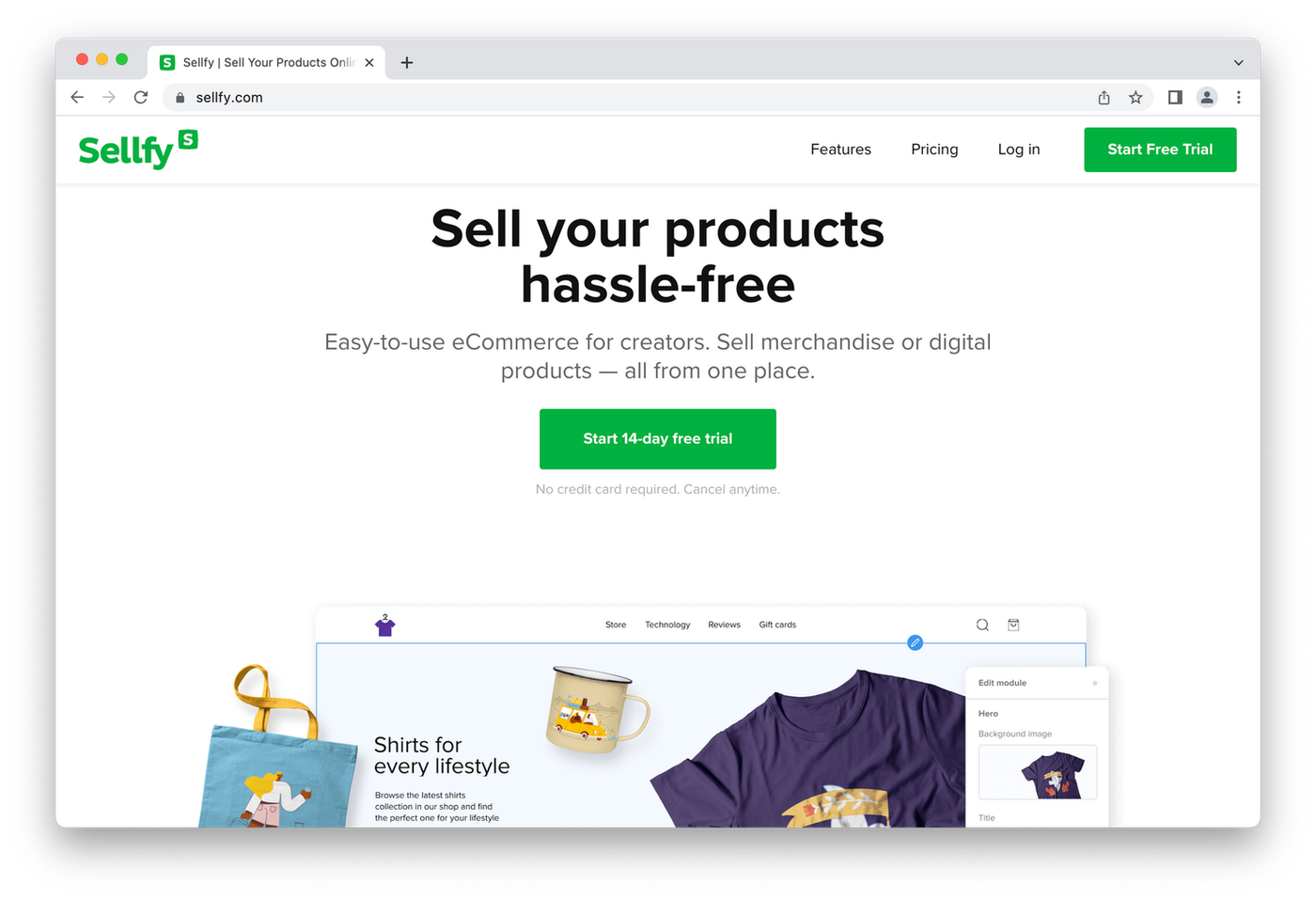 (Image Source: Sellfy)
(Image Source: Sellfy)Pricing:
- Starter: $19/month
- Business: $49/month
- Premium: $99/month
With Sellfy you can create a simple storefront with limited customisation or embed a shopping cart into your existing website. It specialises in print-on-demand and digital products, but can also be used to sell physical goods as well.
While there is a free plan, unfortunately you can’t use it to sell digital products. If we look at their paid plans, the biggest difference is how much you’re able to earn within each bracket (for example, you’re limited to $10k in sales per year under its Starter plan.)
Sellfy comes with native email marketing and has ad management through Facebook and Twitter. It also integrates with Google Analytics, Patreon and Zapier.
3. Payhip
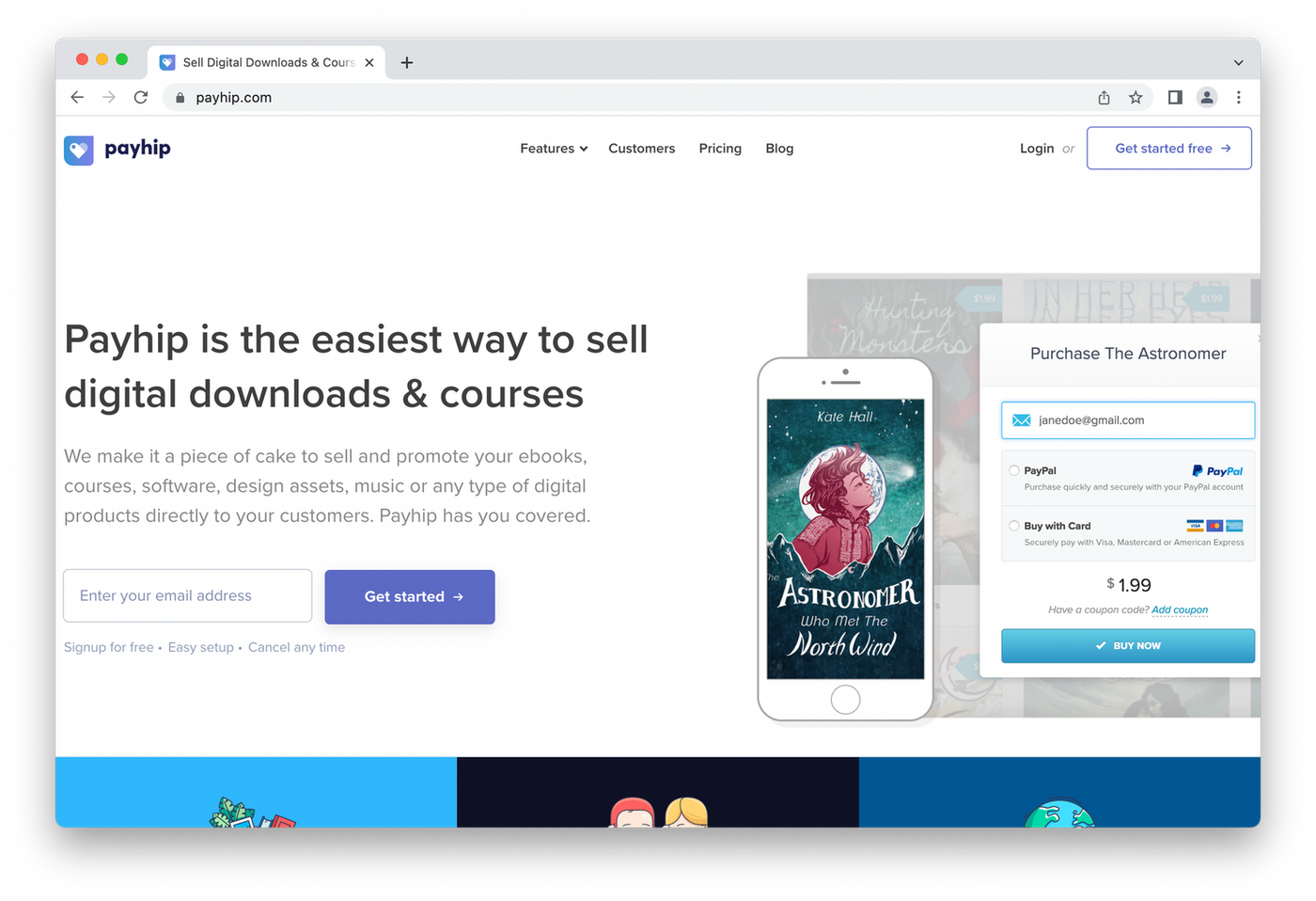 (Image Source: Payhip)
(Image Source: Payhip)Pricing:
- Free Forever: $0/month + 5% transaction fee
- Plus: $29/month +2% transaction fee
- Pro: $99/month
Payhip is a no-frills ecommerce solution focused on digital files and membership sites. If you're someone who has complex needs this won't be for you, however if (ultra) simplicity is your game you might find it interesting.
With payhip customers can pay via PayPal or credit card. Upon paying, they are then provided a digital download option and their files are emailed to them. The membership management options exist alongside this, allowing you to do things like reward customers or run affiliate programs.
Payhip’s plans are structured so that the more you pay, the smaller the transaction fee is, which is similar to Gumroad's pricing strategy. If you don’t have a website, you can direct customers to a landing page with your Payhip checkout page on it, with the option of bringing a custom domain.
4. Podia
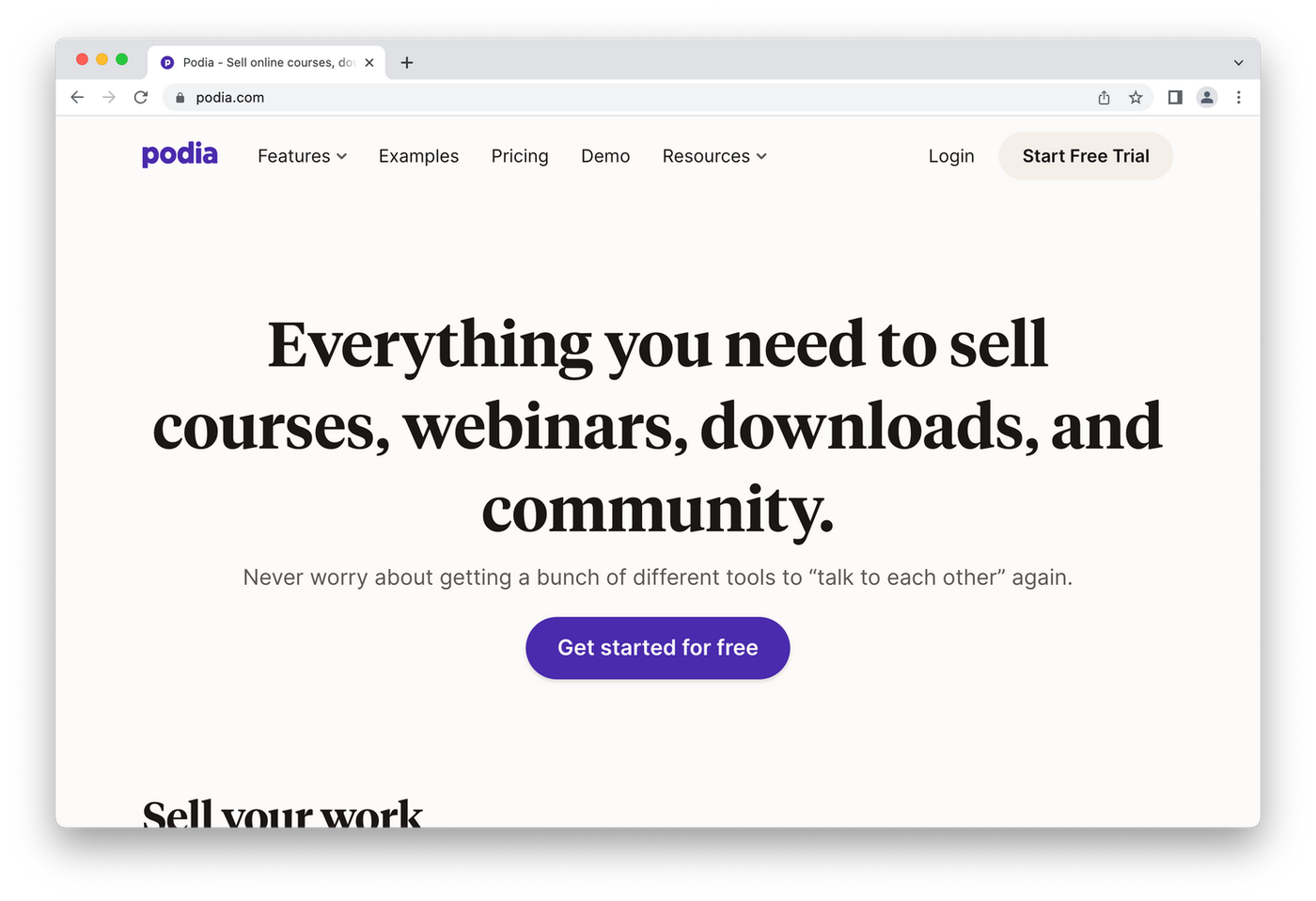 (Image Source: Podia)
(Image Source: Podia)Pricing:
- Mover: $39/month
- Shaker: $89/month
- Earthquaker: $199/month
Podia is a full website solution with a focus on online courses. It provides features that other platforms rely on integrations for, such as email marketing tools and live chat support. These aren’t quite a full replacement for dedicated software such as Mailchimp or Convertkit, but work fine for simple use cases.
Podia allows you to sell digital products, but its membership features are where it truly shines. Interacting with your members or subscribers (e.g. through real-time in-app messaging) is all built-in. It also can bundle products together, which can help with cross- and up-selling.
Plus, with unlimited bandwidth and hosting, it’s especially good for webinars and other videos. Podia is a great option for those who need to host a large volume of files in an easy-to-navigate library.
5. Samcart
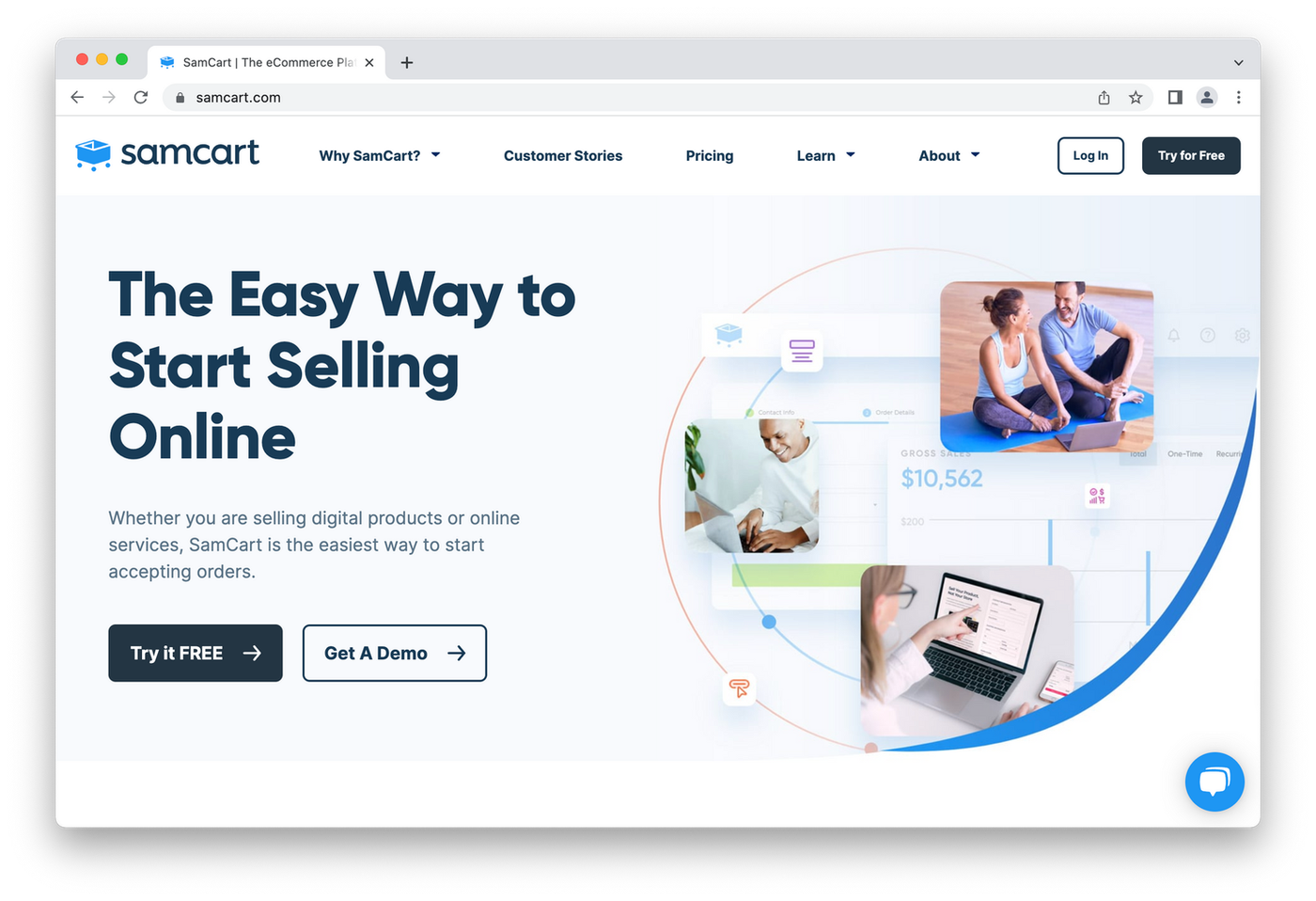 (Image Source: Samcart)
(Image Source: Samcart)Pricing:
- Launch: $49/month
- Grow: $99/month
- Scale: $292/month
Like Podia, Samcart specialises in selling online courses. Unlike Podia, it allows you to sell physical products and services. Products can be provided directly, restricted across membership levels or put out on a drip schedule.
It’s a powerful tool, with advanced features like upsells, cart abandonment follow-up emails, payment plans and A/B testing to help conversion rates. It also offers marketing automation and gives members the ability to manage their own subscriptions.
Unfortunately, many of these features are only available at the higher level plans. Another drawback is a lack of customisation, which restricts your ability to show off your brand.
Form a better life now.
6. Sendowl
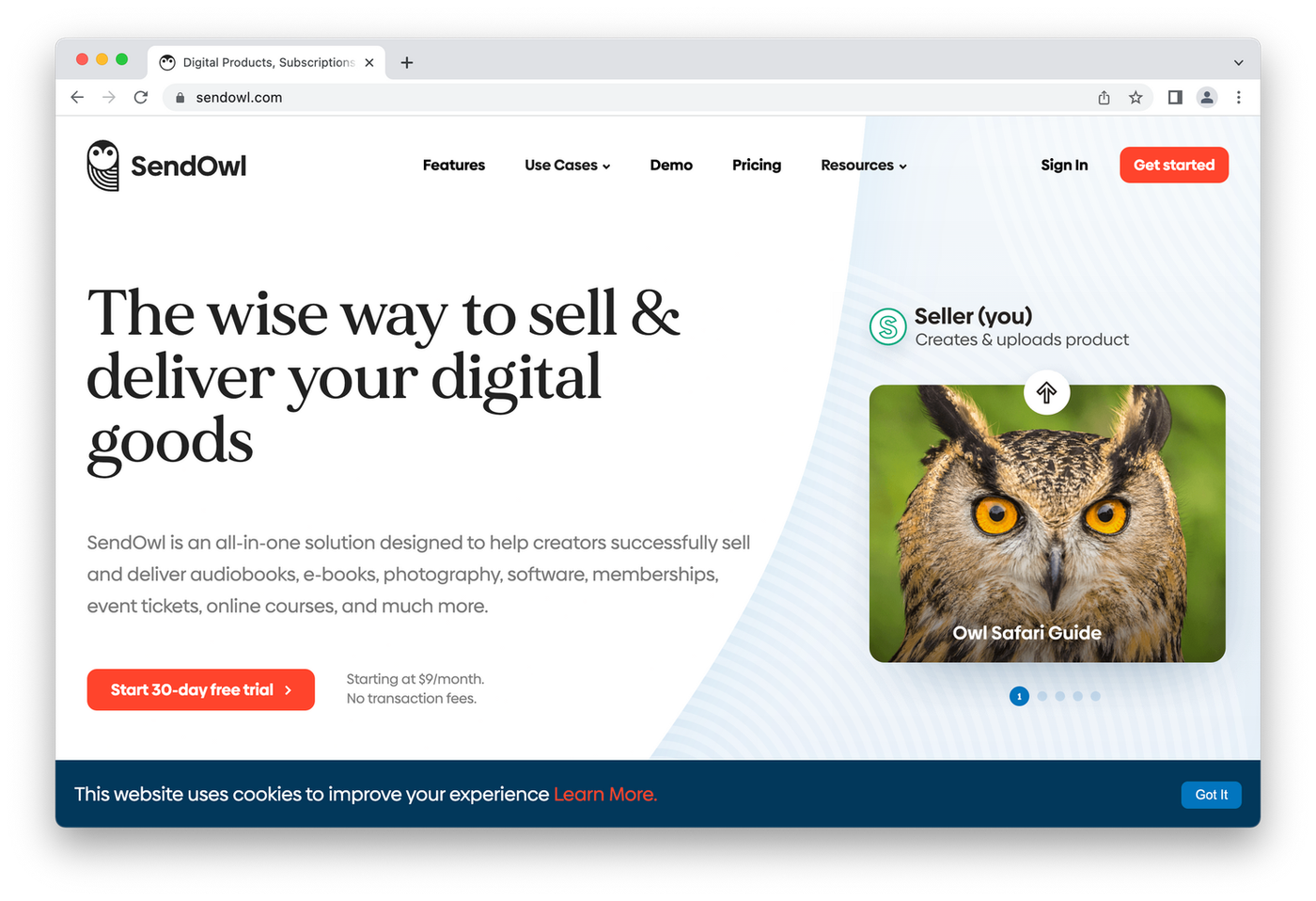 (Image Source: Sendowl)
(Image Source: Sendowl)Pricing:
- Standard: $15/month
- Premium: $24/month
- Business: $39/month
Sendowl is an embeddable checkout software. You can use it to sell digital and tangible products, memberships and subscriptions. With the rigid design and product caps, it’s best suited for small businesses.
Sendowl’s target audience is bloggers who want to venture into digital sales. Affiliate marketing, gifting, and “pay what you want” pricing all lend well to selling to an existing community. It's easy to integrate into your site as a "Buy" button or attach to social media.
7. Shopify
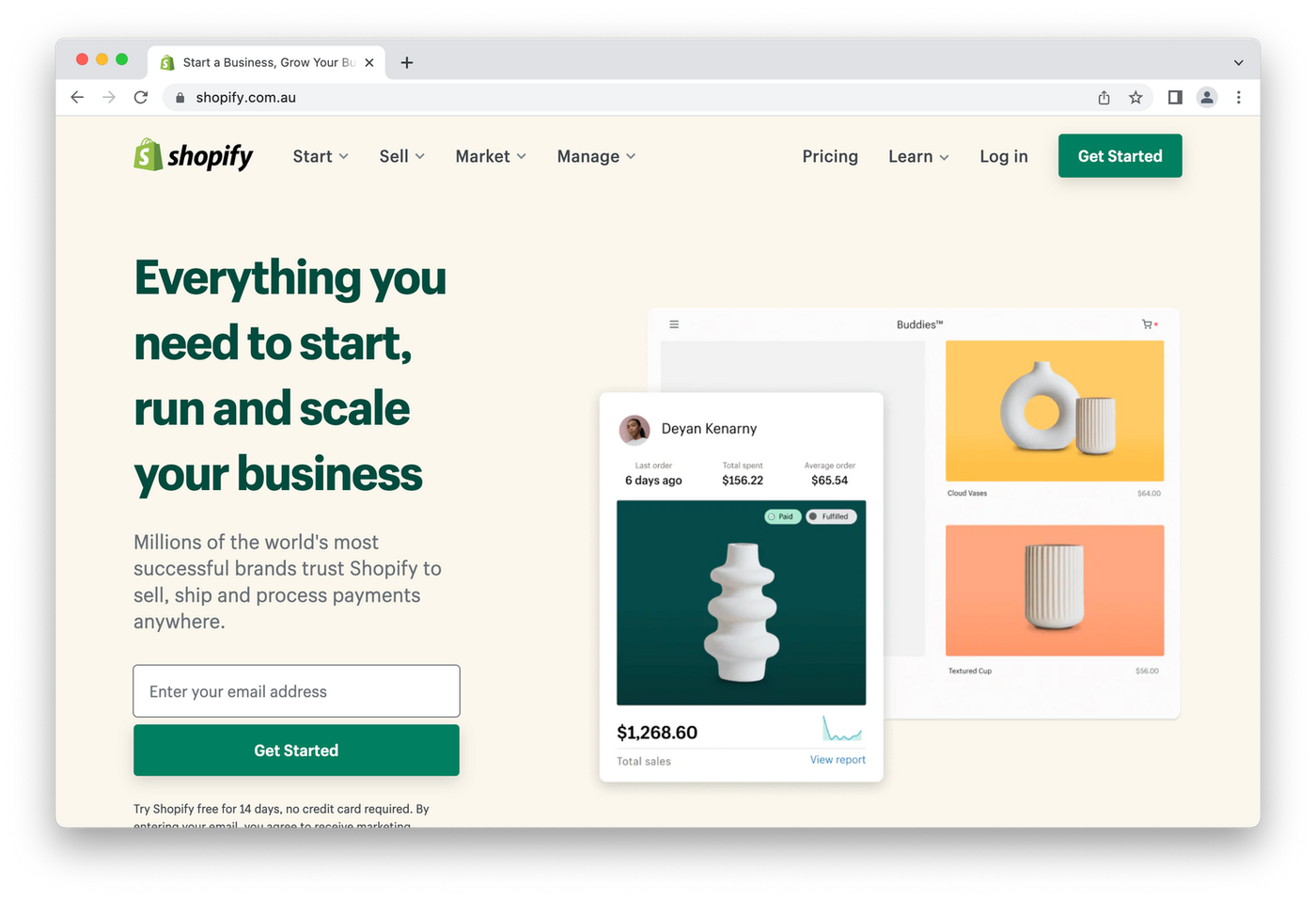 (Image Source: Shopify)
(Image Source: Shopify)Pricing:
- Shopify Lite: $9/month
- Basic: $29/month
- Shopify: $79/month
- Advanced: $299/month
Though there are plenty of worthy alternatives, Shopify remains one of the most popular ecommerce store builders. It offers a full online store experience, allowing you to look after every part of an online business, from inventory to marketing.
Shopify stores are simple to set up and scale with your online business. But it has a tonne of features that can crowd up the UI, which makes it less than ideal for small businesses looking for a solution that "just works".
Shopify also comes with a huge library of apps and themes to supplement your store. Shopify-developed add-ons can do anything from print packing slips to adding CCPA and GDPR compliance to your store—just beware, many of these come at extra monthly costs.
8. WooCommerce
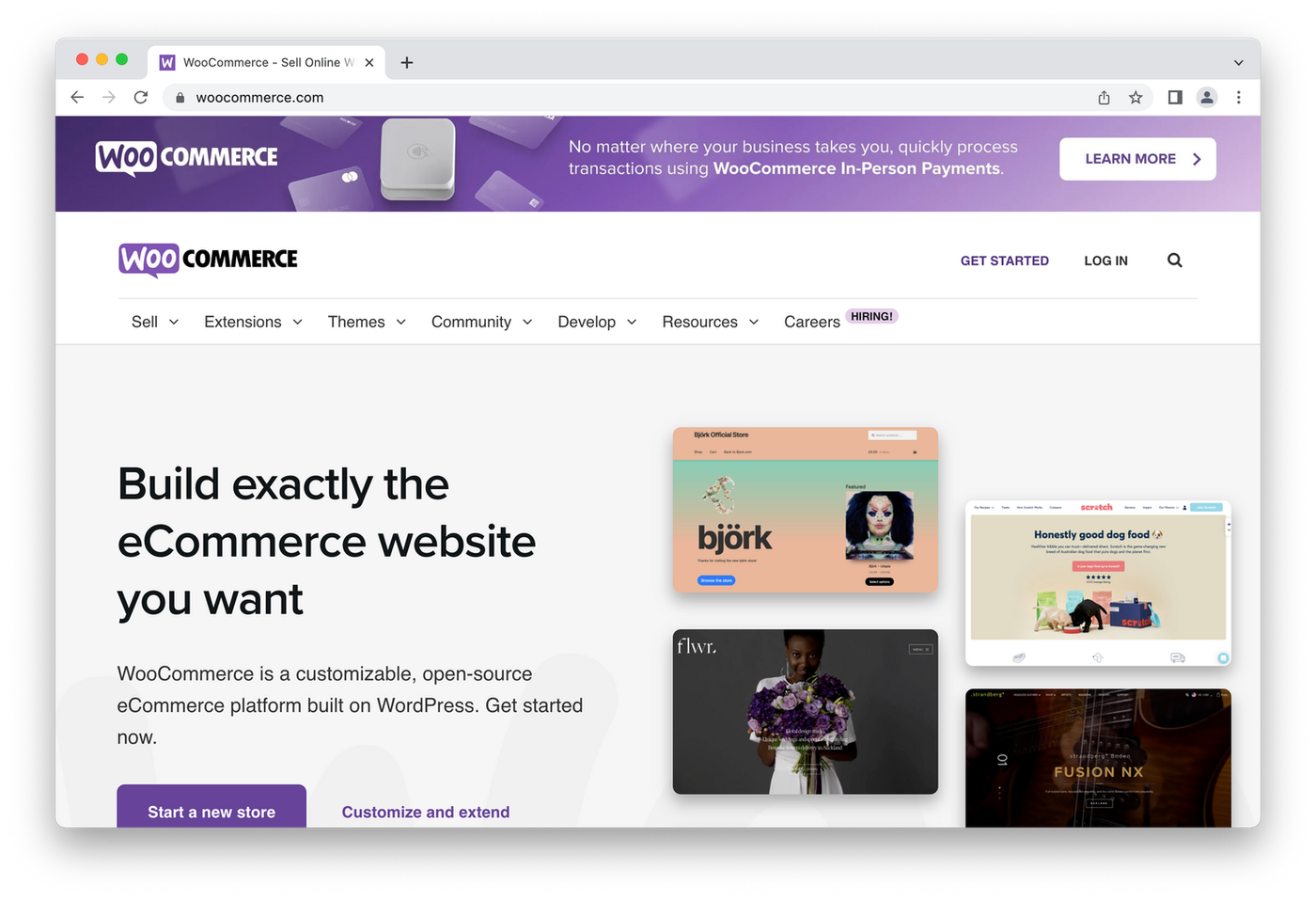 (Image Source: WooCommerce)
(Image Source: WooCommerce)Pricing:
- Free
- Pay for extensions and hosting
WooCommerce is a free and open-source WordPress plugin that gives your WordPress site ecommerce powers. Or at least, it’s kind of free. You have to pay for WordPress hosting, and essential functionality is only unlocked through (rather expensive) paid extensions.
The base product also isn’t hugely intuitive. Particularly if you're not the most tech savvy person on the block. As it’s open-source, you can customise it to be almost anything you like—if you have the know-how. This learning curve is a bit too steep for the average user, though.
9. Hyax
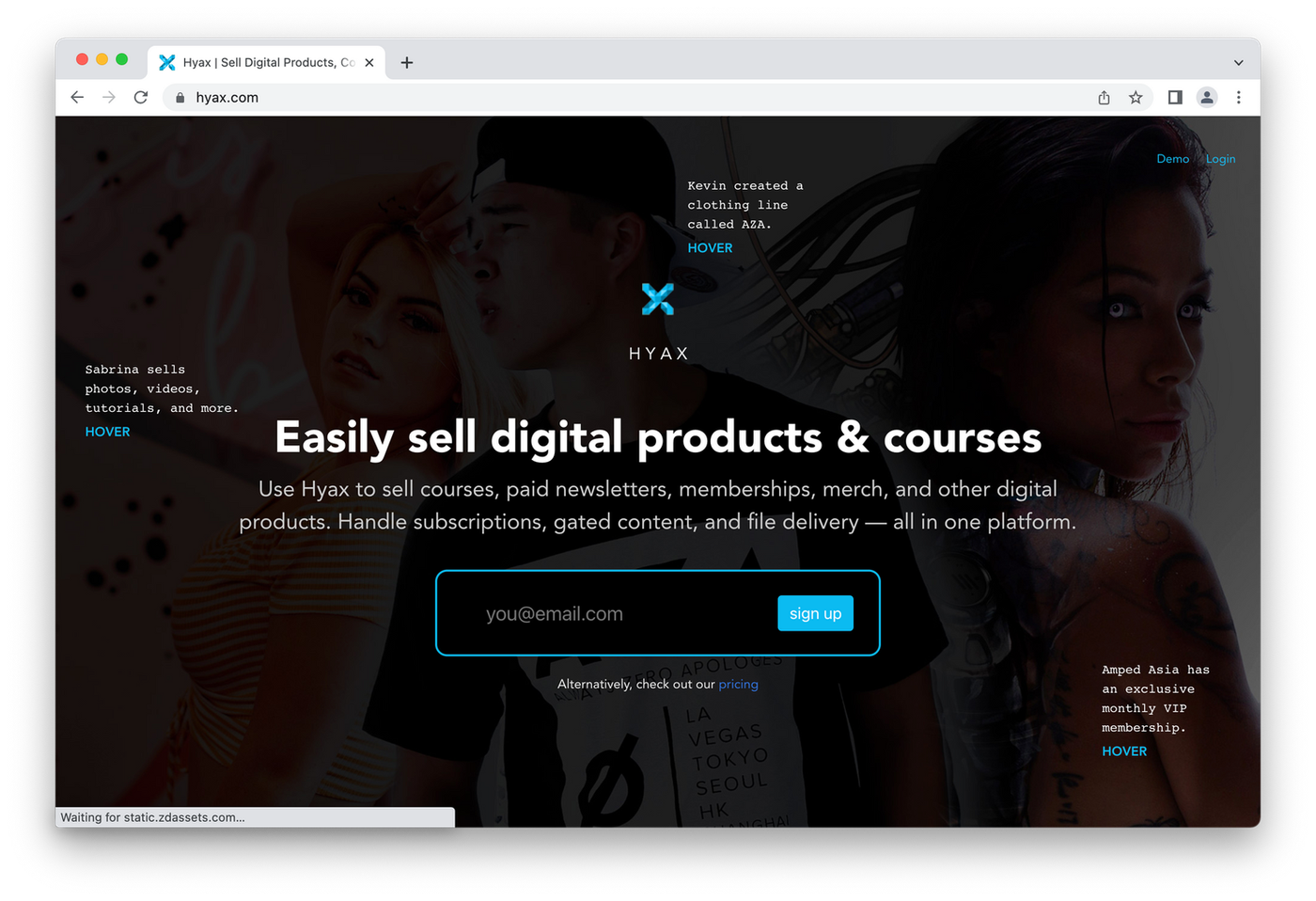 (Image Source: Hyax)
(Image Source: Hyax)Pricing:
- Beginner: $99/month
- Advanced: $199/month
- Enterprise: custom quote
Launched in 2020, Hyax is a relatively new player in the ecommerce arena. It’s designed to be an all-in-one platform—meaning sales, marketing and website features like SEO and landing pages are all included.
You can use Hyax to sell digital and physical products, memberships and courses. Though a bit pricier, Hyax has quite low product/course allowances across their Beginner and Advanced plans (10 and 40 respectively). It’s not designed for quantity of products, but rather on making it easy to sell in limited numbers.
10. Ko-fi
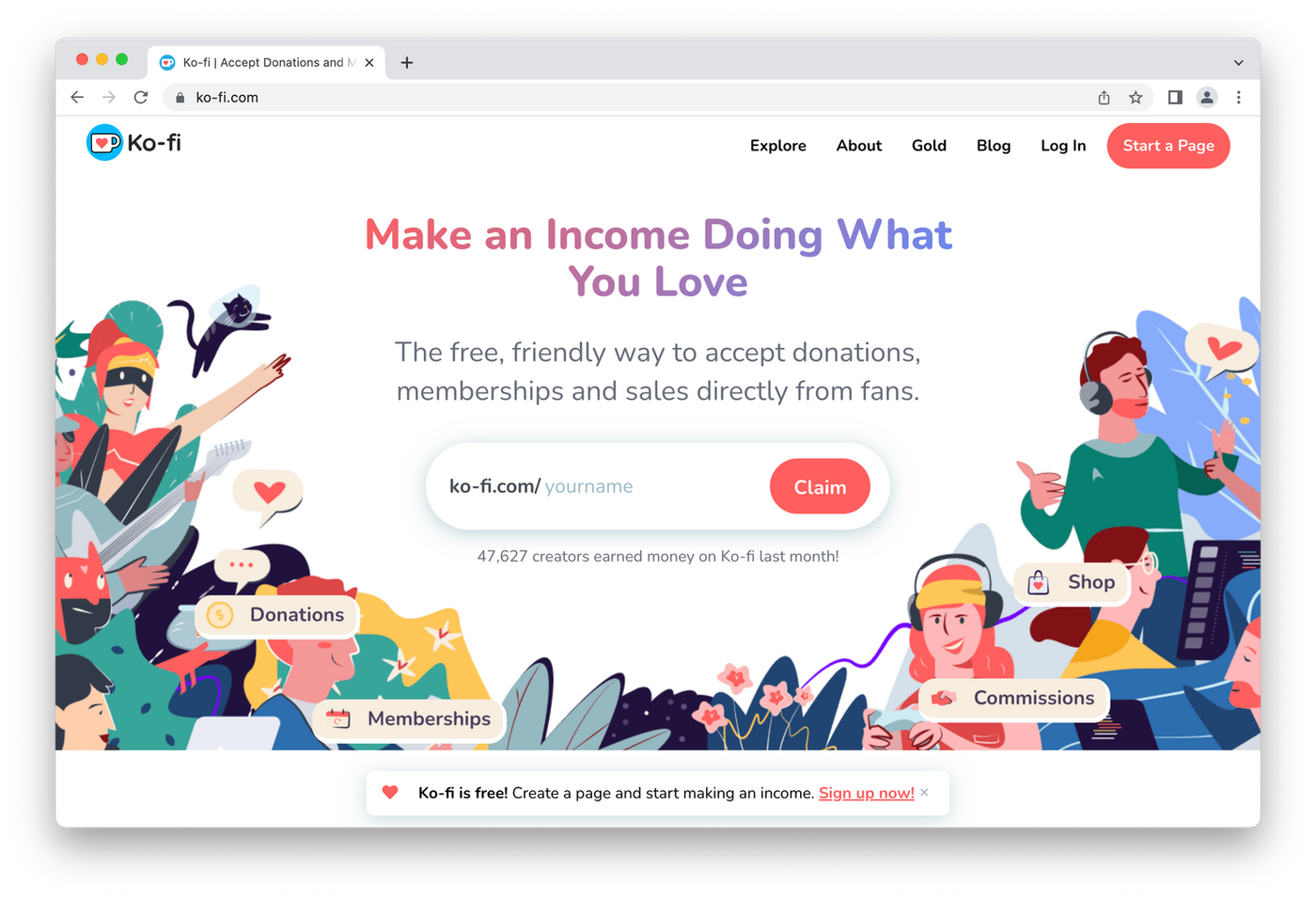 (Image Source: Ko-fi)
(Image Source: Ko-fi)Pricing:
- Free + 5% platform fee (doesn’t apply to donations)
- Gold: $4.50/month
The simplest item on this list, Ko-fi started as a virtual tip jar, allowing creators to get paid small donations by their supporters. It has since expanded to compete with platforms like Patreon as a membership site and an online storefront.
Ko-fi doesn’t really allow for customisation. You can choose a profile picture, banner and a theme colour, but that’s it. It’s not designed as a solution for businesses who need their own website—it’s closer to a social media page that happens to have ecommerce functionality.
You can upload 20GB of digital products to your store, but each product has a size limit of 500MB, which might be restrictive for certain types of creators.
What is the best Gumroad alternative?
Gumroad is a pretty great tool to sell digital products, but it’s not for everyone. There are a lot of alternatives, but we think that Paperform is the best one out there.
Paperform makes it easy to create beautiful, functional, individualised ecommerce pages that take the headache out of running an online store. But, we get that we might be a little biased.
All favouritism aside, here are some of key features Paperform offers that sets us apart from the rest:
- Integrations: directly integrate with tons of apps like Slack, Notion, Google Sheets, etc.
- Automations: build custom combinations of actions using conditional logic, answer piping and integrations to automate your work.
- Email marketing: send automated marketing emails and collect lead data all in the one place.
- Calendar: create calendar events based on actions on your online store, with any detail you like.
- Multi-platform support: your Paperform store looks just as beautiful on mobile or desktop devices.
- Advanced customisation: create an online storefront that represents your brand online, with the ability to customise fonts, colours, feature images and more.
Whether you’re looking to flee Gumroad, or just starting your ecommerce journey, Paperform helps you put your best foot forward. Give it a go today! Check in with our Support team with any questions—they'll be more than happy to help you get up and running.
SEO Marketer
Form a better life now.
Get your 7 day unrestricted trialSmileBox started in a bedroom and scaled to 30,000 orders. Here’s how founder Tom Wrench used Paperf...
When Kathleen Celmins launched her AI-powered app, GlowSocial, she quickly realized that building cu...
Paperform has been recognized as a 2026 G2 Best Software Award winner! It is an honour we are deeply...
Trying to decide between Zapier and Stepper? This in-depth comparison breaks down pricing models, wo...